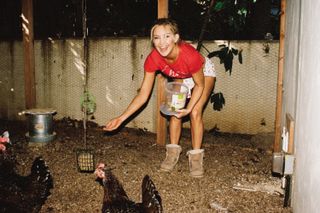Kate Hudson On Body Positivity: An Extract From Her New Book
How to be healthy, the Hudson way

How to be healthy, the Hudson way
Kate Hudson’s new book Pretty Happy: Healthy Ways To Love Your Body is her guide to taking care of yourself (mind and body) – it's a personal account of how she learnt to do just that.
After years of being asked the secret to staying in shape, feeling confident, feeling sexy and staying strong the 36-year-old actress decided to write everything down - because her honest answers couldn't be crammed in to a five-second sound bite.
Here, in an extract from the book, Hudson explains her ‘Body Smart’ philosophy and bullet points the common types of negative thinking we need to recognize and shut down in order to feel good about our bodies.
Kate Hudson will be signing copies of her new book, Pretty Happy, at Selfridges on 4 March, 5-7pm. Buy tickets
YOUR BODY IS SMART (words: Kate Hudson)
For me, reading my body, paying attention to its signals and honouring its natural intelligence, is the key to staying slim, fit and healthy.
Marie Claire Newsletter
Celebrity news, beauty, fashion advice, and fascinating features, delivered straight to your inbox!
If you want to lose weight and keep it off without deprivation or some crazy kind of eating regime, then tuning in to your body will give you the power to take some control over your hunger, and get rid of cravings or the need for extremes – in terms of either food or exercise.
And that takes me to my next point. By truly connecting with yourself and accepting who you are and whatever shape you have, you reject perfection and the idea of extremes. From this vantage point, all of us can be happy – happy just being ourselves. Suddenly, instead of pushing against the grain, we give our bodies what they naturally need to stay centered and feel strong and agile. We don’t have to force ourselves to eat a certain way or exercise a certain way. We work with the body, not against it. And you can trust that your body is smart and knows what it needs and doesn’t need.
Thinking of my body in this way helps me not freak out if I’ve gained ten pounds (or seventy, like I did when I was pregnant with my son Ryder!). Because when I feel bad, I trust that I know how to get back on track. This kind of relationship with myself has not only helped me stay grounded and balanced in the midst of a very hectic career and being a mum of two young boys, but also has made me feel much more trusting of my body. I am so much more relaxed now, not needing to overthink what I eat, how much I eat, when I exercise, or what I do.
Not too long ago I would try to assert control over my body, pushing it way beyond what was good and healthy. I would work out to the point where I was exhausted. I would also eat raw and super-healthy, pushing my stress hormones through the roof because I put so much thought into every bite.In other words, if I gained weight, I tended to overcorrect and get so over-regimented and obsessed that I would either not lose the weight I wanted or sometimes gain weight. Then I would swing the other way and not work out at all. For example, I stopped dancing, an activity I loved, completely for a couple of years. When I eventually went back to it, I had to ask myself, ‘Why hadn’t I been doing this? I love to dance!’
Always trying to control everything around me and within me only made me want to break the rules.

Photo credit: Darren Ankenman THE FIVE BIG TYPES OF NEGATIVE THINKING
Just to prove that you are not alone, hundreds of books and thousands of articles have been written on negative thinking and how to turn it around. Why? Because as humans we get down in thedumps! In fact, there are official categories for all of the negative thoughts that flow through your head on a daily basis. So to sum it up: Welcome to the club. But just like training a muscle, we can train our minds to turn that negative talk into something that doesn’t hurt us but actually helps us! According to cognitivetherapyguide.org, the five types of negative thoughts that bring us down are:
All or Nothing Thinking / Polarising: ‘I have to do everything perfectly because anything less than perfect is a failure.’ All-or-nothing thinking is by far the most common type of negative thinking. Living life has nothing to do with perfection, so when we set up situations to be all good or all bad, we also set ourselves up for failure – failure that makes us feel anxious, self-critical, and less than valuable. All-or-nothing thinking also gets in the way of trying new things – who’d want to risk that if they think failure means you’re a bad, worthless person? Disqualifying the Positive / Filtering: ‘Life always feels like one disappointment after another.’ This kind of thinking comes from blocking out even the possibility of good things happening. Think of Eeyore: it’s not always going to rain!
Negative Self-Labelling: ‘I feel like a failure. I’m flawed. If people knew the real me, they wouldn’t like me.’ How do you think of yourself? If you immediately label yourself using a derogatory or ‘less-than’ term, you limit yourself from growing and from being who you really are.
Catastrophizing: ‘If something is going to happen it will probably be the worst case scenario.’ This type of negative talk is similar to disqualifying the positive: believing that only bad things are going to happen to you.
Personalizing: ‘It’s always my fault.’ When something bad occurs, you automatically blame yourself. For example, you hear that an evening out with friends is cancelled, and you assume that the change in plans is because no one wanted to be around you.
Words: Kate Hudson Image credits: Darren Ankenman
Pretty Happy by Kate Hudson is out now, published by HarperThorsons
The leading destination for fashion, beauty, shopping and finger-on-the-pulse views on the latest issues. Marie Claire's travel content helps you delight in discovering new destinations around the globe, offering a unique – and sometimes unchartered – travel experience. From new hotel openings to the destinations tipped to take over our travel calendars, this iconic name has it covered.
-
 We're fitness experts who've spent 100's of hours testing fit kit - these are the lululemon products we rave about to family and friend
We're fitness experts who've spent 100's of hours testing fit kit - these are the lululemon products we rave about to family and friendKeen to invest in kit that'll last the long run?
By Chloe Gray
-
 Taylor Swift has broken her silence on the meaning of new track ‘Clara Bow’
Taylor Swift has broken her silence on the meaning of new track ‘Clara Bow’By Jenny Proudfoot
-
 George, Charlotte and Louis are learning "new home rules" to help Princess Kate's recovery
George, Charlotte and Louis are learning "new home rules" to help Princess Kate's recoveryBy Jenny Proudfoot